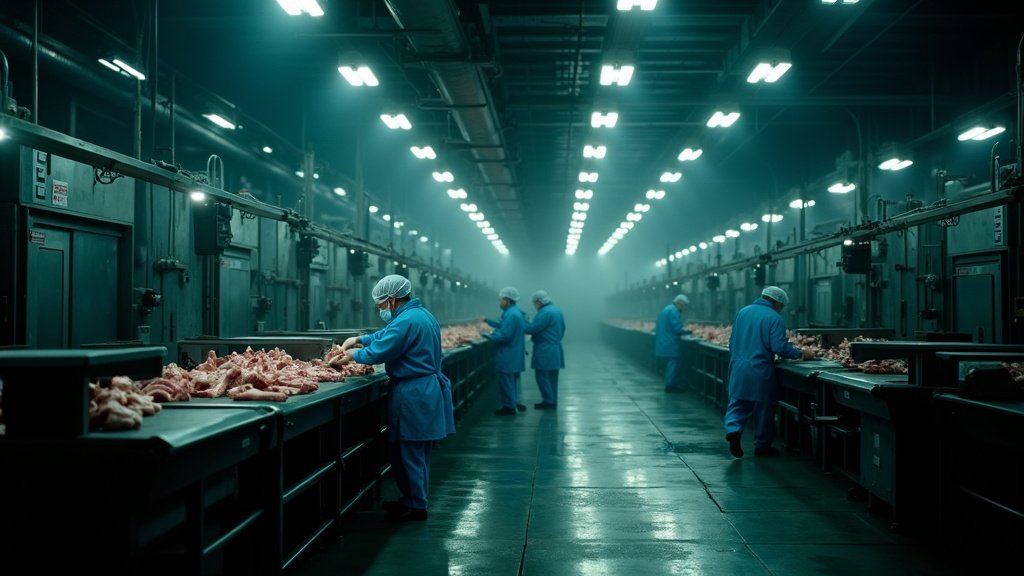The Meat Processing Industry, a cornerstone of American agriculture and a significant contributor to the economy, particularly in states like Texas, is facing increasing scrutiny over its structure, labor practices, and market influence. While the Meat Processing Industry is subject to federal regulations, including oversight from the USDA’s Food Safety and Inspection Service (FSIS), evidence suggests that existing oversight may not be sufficient to address systemic issues and animal agriculture issues. This commentary delves into the multifaceted challenges within the meat processing sector, arguing for sustained regulatory attention to foster a fairer and more competitive market, addressing regulatory gaps meat producers face.
Meat Processing Consolidation and Market Power: A Recurring Concern
The Meat Processing Industry, particularly beef, has seen a dramatic increase in consolidation over the past few decades. In 1980, four firms controlled approximately 36% of the U.S. beef processing market; by recent estimates, this figure has ballooned to about 85%. This meat processing consolidation has led to a situation where a few large, often foreign-owned, conglomerates dominate the market.
This market dominance raises significant concerns about antitrust violations, including potential collusion, price fixing, and market manipulation. While some research suggests that industry efficiency might offset negative price impacts for producers, recent trends indicate a widening gap between cattle prices and wholesale beef prices, suggesting that packers may be exercising market power to the detriment of farmers and consumers. The Trump administration, for instance, initiated a Department of Justice investigation into potential anticompetitive practices by the four largest meatpackers, a key aspect of antitrust meatpacking discussions. However, past investigations have yielded limited enforcement actions, underscoring the need for ongoing, robust oversight rather than one-off inquiries.
The Human Cost: Worker Safety in the Meat Processing Industry
Beyond market dynamics, the Meat Processing Industry is plagued by alarming rates of worker injury and illness. The work is physically demanding, often performed at high speeds on assembly lines, leading to severe stress on workers’ bodies. The injury rate in the meatpacking industry is double that of other American manufacturing jobs. Compounding these risks are hazardous chemicals used in processing plants, which can cause chronic respiratory and other health issues, highlighting critical worker safety meat industry concerns.
A significant portion of the workforce comprises immigrants, many of whom are struggling to survive and may have limited agency or inadequate protections. The COVID-19 pandemic starkly illuminated these vulnerabilities, with meatpacking plants becoming hotspots for outbreaks due to close working conditions and the necessity of refrigerated environments that can exacerbate illness transmission. Despite these risks, efforts to strengthen worker safety meat industry regulations and enforcement have faced challenges, including a decline in OSHA inspectors and guidance that remains discretionary. Recent news has also highlighted the disturbing rise of child labor violations within the industry, with migrant children being illegally employed in hazardous conditions in child labor meat plants.
Regulatory Gaps and the Call for Sustained Attention in the Meat Processing Industry
The existing regulatory framework, managed by agencies like the USDA’s FSIS and the FDA, is extensive but may not be keeping pace with industry developments and food safety regulations. Reports indicate that the USDA has been slow to update crucial food safety standards, particularly concerning pathogens like Salmonella and Campylobacter, while food recalls have surged. Furthermore, the industry has historically lobbied to influence regulations, sometimes pushing for self-regulation or deregulation, which can undermine consumer and worker protections and exacerbate regulatory gaps meat issues.
The concentration of the Meat Processing Industry creates high barriers to entry for smaller businesses, limiting choices for farmers and potentially leading to greater vulnerabilities in the supply chain when large plants face disruptions, as seen during the COVID-19 pandemic. The Texas meat industry, while robust, is not immune to these national trends.
Conclusion: A Need for Systemic Change in the Meat Processing Industry
The recurring issues of meat processing consolidation, farmer and consumer price disparities, and hazardous working conditions demand more than temporary attention from regulators. A one-time investigation, while important, is unlikely to yield systemic change. The Meat Processing Industry requires sustained, rigorous enforcement of antitrust and labor laws, alongside proactive updates to food safety regulations. This sustained focus is essential to ensure a fairer, safer, and more competitive Meat Processing Industry that benefits American ranchers, workers, and consumers alike. This editorial underscores the need for ongoing vigilance and action from regulatory bodies, particularly concerning worker safety meat industry standards.
The complex landscape of the Meat Processing Industry, from its significant presence in Texas to its national implications and animal agriculture issues, requires a commitment to consistent oversight and policy reform. It is through such sustained attention that the industry’s challenges, including regulatory gaps meat considerations and antitrust meatpacking concerns, can be effectively addressed, fostering an environment that prioritizes not just efficiency but also fairness, safety, and competition for all stakeholders. This news serves as a critical reminder of the ongoing importance of regulatory diligence in the Meat Processing Industry.






